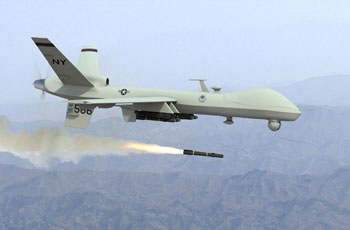|
Militant publishing schedule
(lead article)
U.S. gov’t pushes to
expand Pakistan war
Aerial drones kill more than 560 in 2009

|
|
U.S. Reaper aerial drone firing Hellfire missile. CIA uses air base in Shamsi, Pakistan, for launching strikes in Pakistan’s Federally Administered Tribal Areas. Drones at base are said to be operated by U.S. mercenary company Xe Services, formerly called Blackwater.
|
BY DOUG NELSON
December 21—In what could be the opening of a stepped-up tempo of U.S. military operations in Pakistan, U.S. aerial drones carried out three separate attacks in west central Pakistan December 17-18. The two-day bombardment also sends a message that Washington will resort to unilateral action where the Pakistani government refuses to expand the war against Taliban and allied Islamist forces.
Some 20 people were killed in the U.S. attacks, which were all concentrated in the same area in the tribal agency of North Waziristan. One of the strikes involved an unprecedented five drones, unleashing about 10 Hellfire missiles.
There have been at least 50 U.S. drone strikes in Pakistan this year, killing more than 560 people, including scores of civilians.
The Pakistani army is conducting a major offensive that began in the Mehsud tribal area of South Waziristan in October. The operations have since spread to many other parts of the region. But North Waziristan—where the U.S. strikes have focused since the offensive began—has been exempt from Pakistani operations and remains a sanctuary for two major armed Islamist groups.
In North Waziristan the Pakistani government maintains a peace agreement with Pakistan-based Taliban forces led by Hafiz Gul Bahadur. The Pakistani government has also denied Washington’s requests to turn its army against Siraj Haqqani, who commands one of the main forces at war with U.S.-led troops across the border in Afghanistan.
Facing widespread opposition among Pakistanis against the U.S. wars in Afghanistan and Iraq, top Pakistani government and military officials have resisted pressure from Washington to expand its war at this time. “We’re committed to this war, but we’ll fight it on our terms,” a Pakistani intelligence official, who spoke on condition of anonymity, told the Washington Post. “We’ll prioritize targets based on our interests. We don’t want them to be dictated to us.”
U.S. and Pakistani intelligence agencies supported the Haqqani group with arms and money in the 1980s when it fought as part of the rightist Mujahideen forces against the Soviet army in Afghanistan. The Haqqani network later allied itself with the Taliban movement after the Taliban wrested control over most of Afghanistan in the mid-1990s.
The Pakistani government continued to back Haqqani along with the Taliban as proxy forces in its contest with India over influence in Afghanistan. Islamabad may still consider these forces potential assets, as the contest between the two rivals over Afghanistan is once again heating up.
A key aspect of Washington’s Afghan war strategy hinges on calming hostilities between the capitalist rulers in Pakistan and India in order to reduce the Pakistani military’s focus on its rivalry with India. To this end, Washington has sought ways to encourage resolution to conflicts between the two nuclear powers.
Top Pakistani officials have leveraged this to press for U.S. support in resolving the territorial conflict with India over Kashmir to Islamabad’s favor and curbing growing Indian economic and political influence in Afghanistan. They have also accused New Delhi of aiding the Baloch separatists’ insurgency in Pakistan’s Balochistan Province.
Anti-U.S. sentiment
The top echelons of the Pakistani military and government appear committed to Islamabad’s alliance with Washington, albeit on their own terms. But widespread anti-U.S. sentiment among the population and government bureaucracy remains strong and has been exacerbated by the expansion of U.S. military operations in the country.
At least 135 U.S. diplomats have been refused visa extensions, leaving parts of the U.S. embassy shorthanded at a time when the White House is planning to increase embassy staff from 500 to 800 over the next 18 months, reports the New York Times.
“Unfortunately, the Americans are arrogant,” a Pakistani security official told the Times. “They think of themselves as omnipotent. That’s how they come across.”
Husain Haqqani, the Pakistani ambassador to the United States, denied there was any general harassment campaign against U.S. diplomats, attributing visa denials to the bureaucratic process and a sharp increase in requests.
Meanwhile, the end of a political amnesty law for politicians and government functionaries reveals a deep factionalism in the Pakistan ruling class and a weakening of President Asif Ali Zardari’s government. The U.S.-brokered National Reconciliation Ordinance—set up in 2007 to allow former prime minister Benazir Bhutto and her husband Zardari to return to Pakistan—was annulled December 16. As many as 8,000 corruption charges could now be reopened against officials, including the president himself.
Nearly 250 government officials were immediately put on an “exit control list.” An arrest warrant was issued for Interior Minister Rehman Malik and Defense Minister Ahmed Mukhtar was blocked from boarding an airplane to China where he was to close a warship deal with Beijing.
| 


